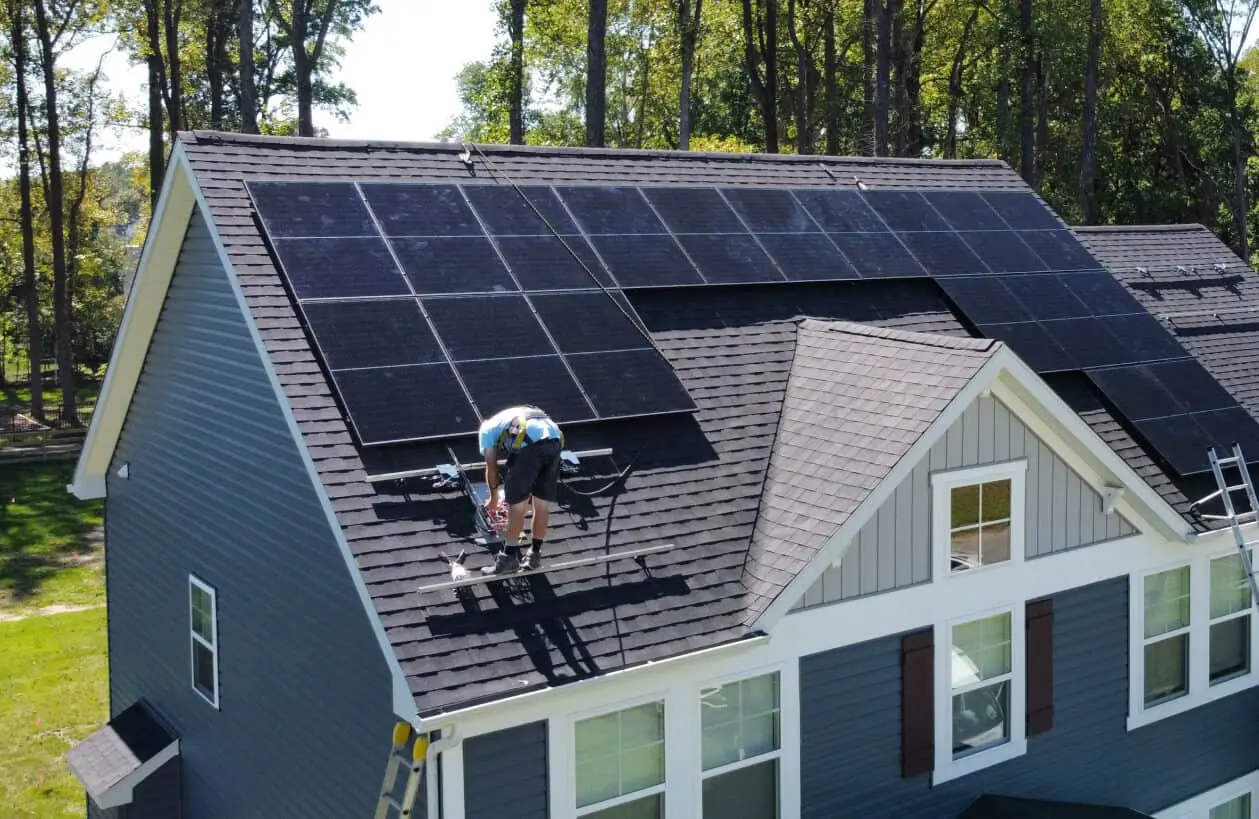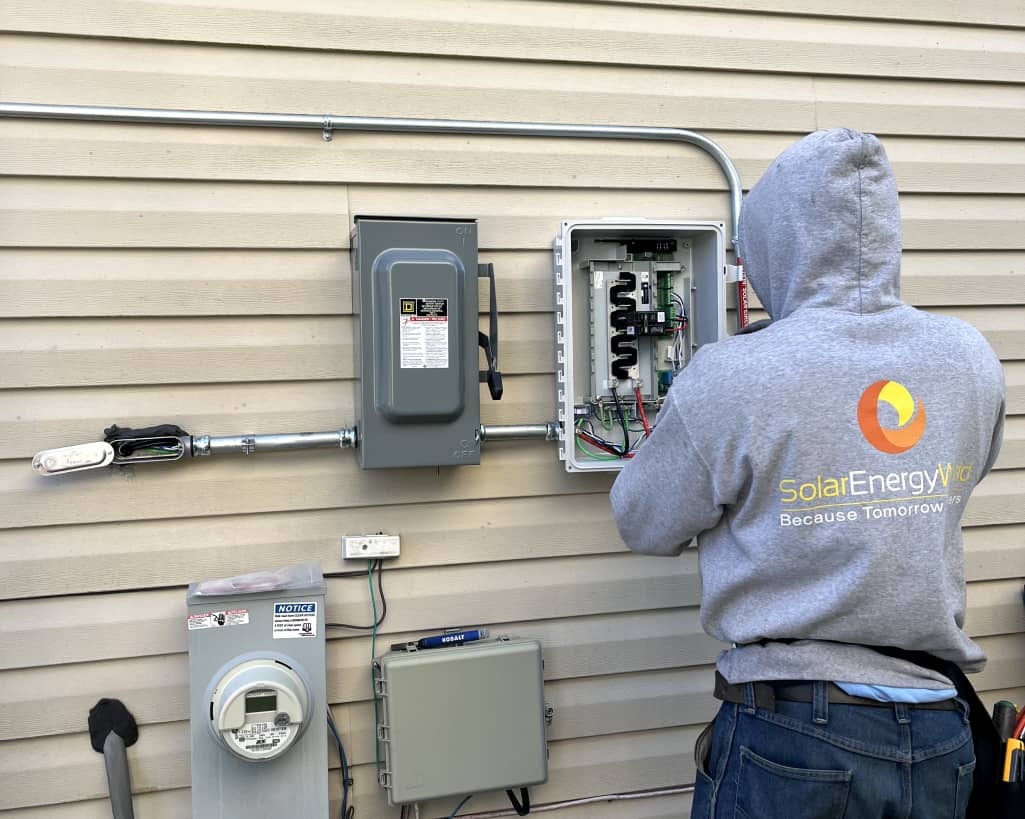Article
Exploring the Basics of Solar Energy

Solar energy is the clean, inexhaustible power derived directly from the sun. It is one of the most promising sources of renewable energy available today. Through innovative photovoltaic (PV) technology, we can convert sunlight into electricity, offering a green alternative to fossil fuels. Understanding the basics of solar energy is the first step towards appreciating the potential of solar power in our daily lives.
Photovoltaic technology, or PV, is at the heart of solar energy production. Solar panels, equipped with PV cells, convert the sunlight hitting your roof into usable electricity. It allows homeowners to generate clean energy right where it’s needed, reducing reliance on the grid and decreasing electricity bills.
Every hour, the sun beams down more energy than all of humanity uses in a whole year. We capture this incredible resource through cutting-edge technology, primarily using solar panels to create electricity, and designing buildings in smart ways to stay warm in winter and cool in summer, without using as much energy.
For homeowners, diving into solar energy is an empowering step towards independence from rising utility costs and a meaningful contribution to environmental conservation. Embracing solar power at home is more than an investment in your property—it’s an investment in a sustainable future, securing a cleaner, greener world for generations to come.
Components and Functioning of Solar Panels
Solar panels work by absorbing sunlight with their photovoltaic cells, creating an electric field across layers of silicon. This field drives the flow of electricity, powering your home with renewable energy. The transformation from sunlight to electricity is a brilliant example of solar power basics in action.
Solar panels are primarily made from silicon, available in two types: monocrystalline and polycrystalline. Monocrystalline panels, known for their efficiency and sleek appearance, are made from a single crystal structure. Polycrystalline panels, although slightly less efficient, offer a more affordable option without significantly compromising performance. Both types are crucial in understanding solar panel information for prospective users.
Incentives and Rebates for Going Solar
Adopting solar energy for your home is not just an environmentally conscious decision but also a financially smart one, thanks to a variety of incentives, tax credits, and rebates offered by governments and utility companies. These financial benefits are designed to lower the barriers to solar adoption, making it more accessible and affordable for homeowners. Understanding and leveraging these incentives is an essential aspect of solar energy basics, pivotal for anyone considering the transition to solar power.
Government Tax Credits
One of the most significant incentives for going solar is the federal solar investment tax credit (ITC), which allows homeowners to deduct a portion of their solar installation costs from their federal taxes.
This tax credit can significantly reduce the overall cost of going solar, making it an attractive option for many homeowners. Some states offer additional tax credits, further decreasing the net cost of solar panel installation. To dive deeper into the array of solar tax credits, visit our Solar Tax Credits & Incentives page. For specific details on incentives available in your state, continue to our State-Specific Incentives section below.
State and Local Rebates
Many states, municipalities, and local governments offer direct rebates for solar energy installations. These rebates can further reduce your upfront costs, sometimes by thousands of dollars, depending on your location. Explore the incentives and credits available in your state by clicking on the links below:
These incentives may vary widely from one area to another, so it’s important to research and apply early to maximize your savings.
Solar Renewable Energy Certificates (SRECs)
In certain states, homeowners can earn Solar Renewable Energy Certificates (SRECs) for the electricity their solar panels generate. SRECs can then be sold on a market to utilities needing to meet renewable energy requirements, providing an additional income stream for solar panel owners. The value of SRECs varies depending on market demand and state regulations.
Performance-Based Incentives (PBIs)
Some regions offer performance-based incentives (PBIs), where you are paid based on the actual electricity your solar system produces over time. These payments are usually set for a guaranteed period and can provide a steady income to offset the cost of installation and maintenance.
Property and Sales Tax Exemptions
To encourage solar adoption, some jurisdictions exempt solar energy systems from property tax assessments, meaning your property taxes won’t go up as a result of installing solar panels. Additionally, several states offer exemptions on sales tax for solar panel purchases, providing immediate savings on the cost of solar equipment.
Before committing to solar, it’s crucial to explore the specific incentives available in your area. These financial benefits not only reduce the initial investment in solar panel installation but also contribute to the ongoing savings on your energy bills, making solar energy a more attractive and viable option for homeowners.
Net Metering and Its Benefits
Net metering is a beneficial billing policy for solar panel owners, allowing them to earn credits for the surplus electricity they supply back to the grid. This system turns your home into a mini power station: when your panels produce more electricity than needed, the excess is sent to the grid, crediting your account.
Then, you can use these credits to draw power from the grid when your solar system isn’t generating enough, like at night or on cloudy days, effectively reducing your electricity bills and shortening the payback period of your solar investment.
The advantages of net metering extend beyond individual savings, promoting the adoption of renewable energy and contributing to a more resilient power grid.
By incentivizing homeowners to contribute clean, sustainable energy, net metering supports a decrease in carbon emissions and helps to stabilize electricity costs for everyone. It’s crucial, however, to understand the specific policies and benefits in your area, as net metering regulations can vary widely.
Maintenance and Longevity of Solar Panels
Solar panels are celebrated for their durability, offering a long lifespan of 25 to 30 years with minimal upkeep, making them a dependable source of renewable energy for homeowners. Maintenance primarily involves routine cleaning to remove dust, leaves, and other debris that could hinder sunlight absorption, ensuring optimal performance.
Periodic professional inspections can ensure the system’s integrity and efficiency. These checks help identify and rectify minor issues like loose wiring or damage from severe weather, preventing potential future complications.

Additional Considerations for Homeowners
As you explore the benefits of solar energy for your home, there are several key factors to consider beyond the initial installation of solar panels. These considerations ensure that your transition to solar energy not only meets your current energy needs but also anticipates future requirements and maximizes the benefits of your investment.
Safety and Reliability of Solar Panels
Solar panels are engineered for maximum safety and reliability, undergoing extensive testing to guarantee their resilience against severe weather conditions such as heavy rain and strong winds. This meticulous design process ensures that solar energy remains a reliable and secure choice for powering your home, providing peace of mind about the durability and dependability of your solar energy system.
The Benefits of Solar Batteries
Experience the next level of energy independence with solar batteries! Integrating solar batteries with your solar panel system allows you to harness and store surplus energy on sunny days for use anytime the sun isn’t shining. This ensures your home enjoys a consistent supply of power during the night,day or inclement weather, and reduces reliance on the grid.
It’s an investment that not only enhances the efficiency of your solar setup but also maximizes your return, making solar energy an even smarter choice for your home. Discover the power of solar batteries and how they can transform your energy usage into a more sustainable, autonomous system. Visit our page about solar batteries now to learn more about bringing this cutting-edge technology into your home.
Understanding Energy Efficiency in Your Home
Before installing solar panels, assessing your home’s energy efficiency can lead to more effective use of solar energy. Upgrading to energy-efficient appliances, improving insulation, and sealing leaks can reduce your overall energy consumption, allowing you to get the most out of your solar panel system. A more energy-efficient home requires fewer solar panels to meet its energy needs, optimizing your investment.
Navigating Local Regulations and Permits
It’s essential to understand the local regulations and permits required for solar panel installation in your area. Navigating these legal requirements can be complex, but it’s crucial for ensuring that your solar energy system complies with all local zoning laws, building codes, and homeowners association rules. Familiarizing yourself with these regulations beforehand can streamline the installation process.

Considering the Aesthetics of Solar Panel Installation
While the primary function of solar panels is to generate clean energy, their appearance on your home is also an important consideration. Modern solar panels offer sleek designs that can complement your home’s aesthetics. Some homeowners may also consider building-integrated photovoltaics (BIPV), which seamlessly incorporate solar technology into building materials such as roof shingles or windows, offering a more visually appealing alternative to traditional panels.
Each of these considerations plays a vital role in ensuring that your switch to solar energy is well-informed, customized to your specific needs, and aligned with your long-term goals.
Steps to Get Started with Solar Energy
Ready to embrace the power of solar energy? Begin your journey with Solar Energy World, where our reputation for excellence and a wealth of positive reviews stand as a testament to our commitment to quality. Dive into a seamless transition to solar with our expert team, guiding you every step of the way—from selecting the perfect solar solution tailored to your needs to understanding the installation process in clear, understandable terms.
Experience the Solar Energy World difference and join the renewable energy revolution with confidence.
Want a Free Solar Estimate?
Fill out the form to get started today.

